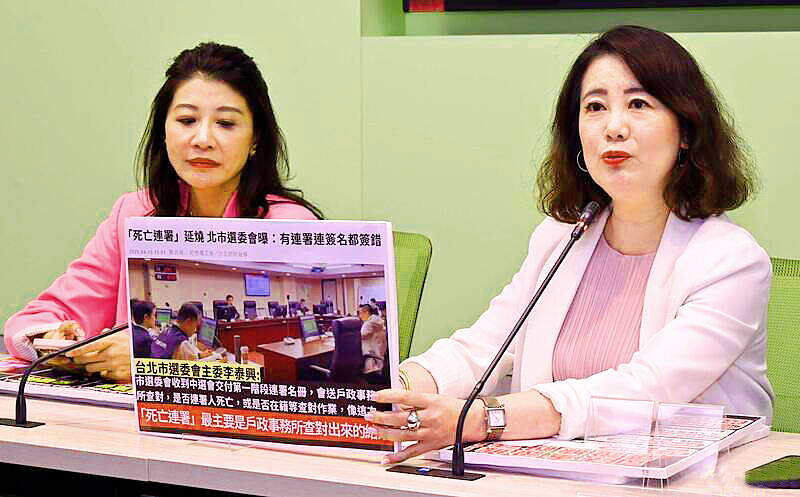Chinese Nationalist Party (KMT) accusations of judicial persecution ring hollow given the large numbers of “dead people” found on their recall signature petitions, the Democratic Progressive Party (DPP) said yesterday.
The KMT has in the past few days unfairly accused public prosecutors of targeting KMT members, and leveled charges of political interference in the justice system by the ruling party, DPP caucus chief executive Rosalia Wu (吳思瑤) told a news conference at the Legislative Yuan in Taipei.
“Judicial probes into fraud and signature forgery in recall petitions are based on material evidence, not politics. We urge both the KMT and the TPP [Taiwan People’s Party] not to disparage and smear Taiwan’s justice system to further their own party’s interests and draw media attention,” Wu added.

Photo: Liu Hsin-de, Taipei Times
Local election commission officers have found 1,923 instances of “signatures” by deceased people in KMT-led signature campaigns to recall DPP lawmakers, Wu said.
That is more than 160 times higher than the 12 instances found in campaigns led by citizens’ groups to oust KMT legislators, she added.
About 30 percent of the KMT campaigns contain irregularities and errors, including possible fraud and likely forged signatures of dead people, compared with 4 percent by citizens’ groups, Wu said, citing the latest available figures.
DPP Legislator Michelle Lin (林楚茵) said that signatures submitted by all recall campaign groups were verified by city and county election commission officials, who cross-checked them with local household registration offices.
Therefore, the KMT has no ground to stand on when they protest that the party was being unfairly targeted when its members were questioned by prosecutors about the fraudulent signatures, Lin said, adding that two of the most prominent probes involved cases in Taipei and New Taipei City, which are governed by KMT mayors.
“The irregularities and violations clearly show that the campaigns to recall DPP legislators are led by KMT Youth League and party members, in which they merely copied names and personal information from old party membership lists. That contrasts with citizens’ groups and activists not affiliated with political parties who have diligently set up stations outside to ask citizens to join their campaign and sign up in person,” Lin added.
Attorney Huang Di-ying (黃帝穎) said that the “signatures of deceased people” were most likely done by KMT members by copying members’ lists to meet the signature threshold and deadline.
They could be charged with forgery under Article 211 of the Criminal Code, with offenders facing a lengthy sentence, he added.

Nipah virus infection is to be officially listed as a category 5 notifiable infectious disease in Taiwan in March, while clinical treatment guidelines are being formulated, the Centers for Disease Control (CDC) said yesterday. With Nipah infections being reported in other countries and considering its relatively high fatality rate, the centers on Jan. 16 announced that it would be listed as a notifiable infectious disease to bolster the nation’s systematic early warning system and increase public awareness, the CDC said. Bangladesh reported four fatal cases last year in separate districts, with three linked to raw date palm sap consumption, CDC Epidemic Intelligence

Two Taiwanese prosecutors were questioned by Chinese security personnel at their hotel during a trip to China’s Henan Province this month, the Mainland Affairs Council (MAC) said yesterday. The officers had personal information on the prosecutors, including “when they were assigned to their posts, their work locations and job titles,” MAC Deputy Minister and spokesman Liang Wen-chieh (梁文傑) said. On top of asking about their agencies and positions, the officers also questioned the prosecutors about the Cross-Strait Joint Crime-Fighting and Judicial Mutual Assistance Agreement, a pact that serves as the framework for Taiwan-China cooperation on combating crime and providing judicial assistance, Liang

Reports of Taiwanese going missing, being detained or interrogated, or having their personal liberties restricted in China increased about fourfold annually last year, the Mainland Affairs Council (MAC) said yesterday. Last year, 221 Taiwanese who traveled to China were reported missing, were detained and interrogated, or otherwise had their personal freedom restricted, up from 55 the previous year, the council said. Reopening group tours to China would be risky, as it would leave travelers with no way to seek help through official channels after Beijing shut down dialogue between the associations tasked with handling cross-strait tourism, the MAC said. Taipei’s Taiwan Strait Tourism

SHIFT: Taiwan is evolving from a transit stop into a tourist destination, with more international travelers willing to spend on tours, dining and cultural activities Taiwan rose three places in the World Tourism Barometer to 36th globally in 2024, with international tourism revenue of US$10.028 billion, the Tourism Administration said on Monday. The UN Tourism Organization publication said that its focus has switched from whether a country has returned to pre-COVID-19 levels of tourism to the amount spent by a tourist during an overseas trip. The nation last year welcomed 8.57 million international tourists, about 9 percent more than in 2024, with most tourists coming from Japan, South Korea, and Hong Kong and Macau, all of which accounted for at least 1 million tourists each. During the first